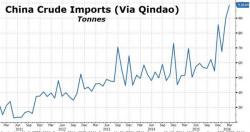It's Now Almost Impossible To Save For Retirement
Submitted by Simon Black via SovereignMan.com,
My grandfather was something of a Renaissance Man.
He was a farmer, schoolteacher, fisherman, collector, real estate investor… and one of those guys who always seemed to know how to do everything.
He could take apart an engine, build a house with his bare hands, tame wild horses, treat life-threatening wounds, play the guitar… and he was extremely well respected in his community.

